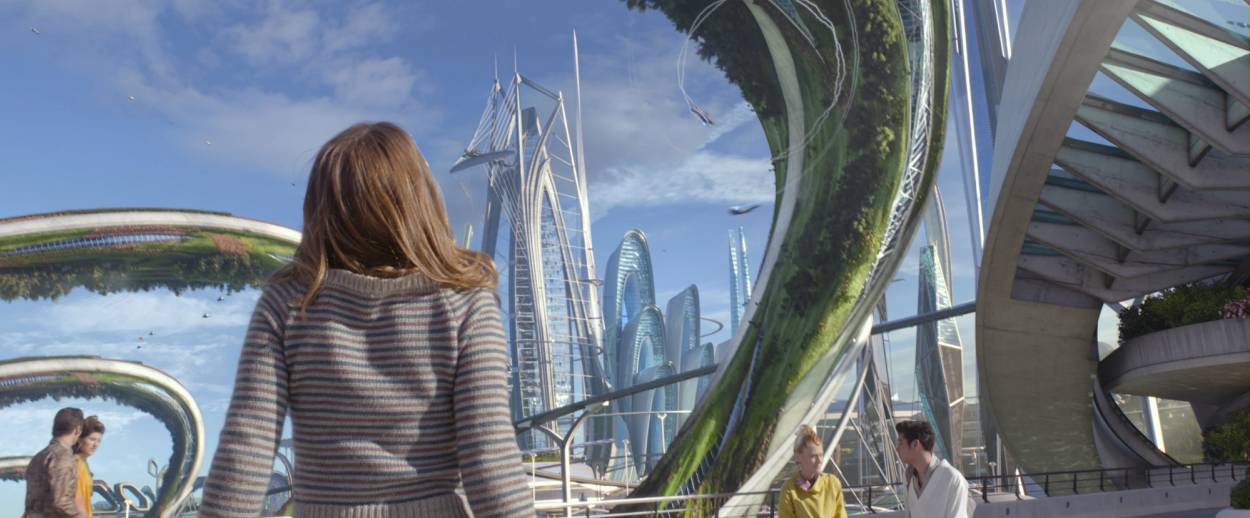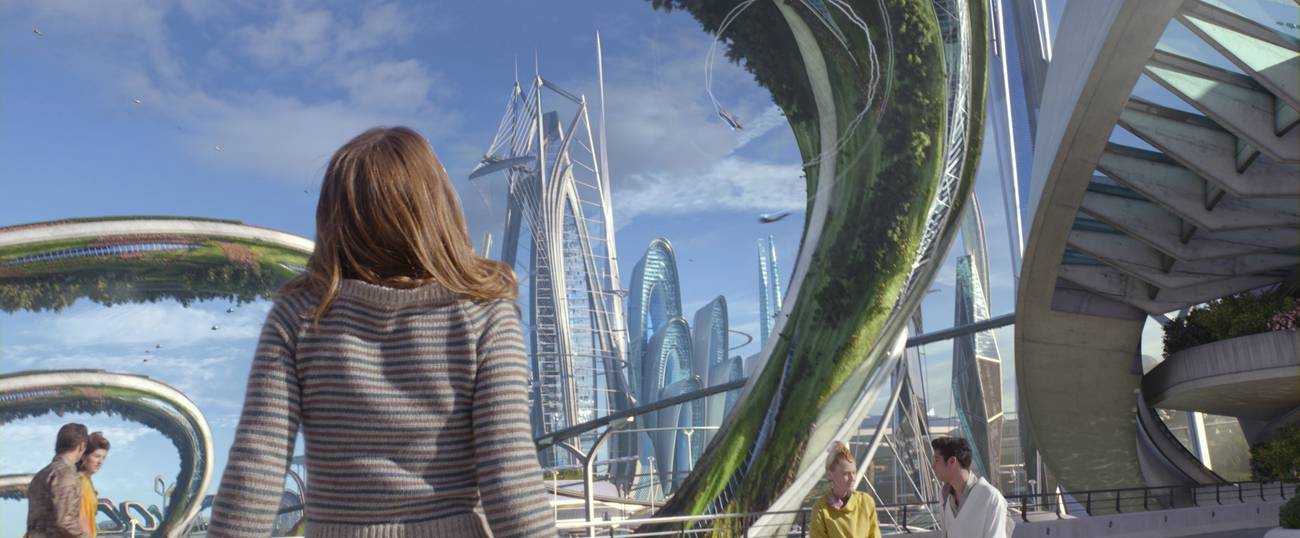It’s a Small—and Exclusionary—World After All
Disney’s Tomorrowland is a more liberal version of Ayn Rand’s toxic classic, Atlas Shrugged




Look, I’ll be honest: Tomorrowland has never been my favorite Disneyland section. Sure, I like Space Mountain just fine, and for some reason always end up using the alien-themed bathroom at the Pizza Port, where I also eat, but Disney’s streamlined vision of a future filled with chrome spires, levitating monorails, and personal jet pack travel has never quite captured my imagination.
At least not quite the same way as, say, the feel of Adventureland’s doomed 1930s semi-racist jungle expedition feel, or the Bavarian kitsch fever-dream of Fantasyland. My favorite Disney ride of all time is the much-maligned “It’s a Small World After All,” which puts forward a utopian vision of the future, based more on national costume and mid-century toy design than rocket propulsion and unisex space jumpsuits. But it was precisely the alleged prominence of my beloved gondola jaunt around the world in Disney’s new live-action extravaganza Tomorrowland that convinced me to finally go see it.
In Tomorrowland the film, the It’s a Small World ride which debuted at the 1964 New York World’s Fair, functions as a sort of secret metaphysical portal, shuttling the young Frank Walker (played in his curmudgeonly-adult state by George Clooney), and the other worthies designated as such by the child-robot talent scout Athena (Raffey Cassidy), who wears with a special “T”-emblazoned souvenir badge. Together they plunge into the space-age utopia of Tomorrowland, an alternate dimension populated by visionary scientists, artists, inventors, and intellectuals, who are free to build, create, think, and legislate free from any pesky interference from regular, non-visionaries who are too stupid, greedy, apathetic or corrupt to know any better.
The young Frank, thanks to the proto-jet pack he presented to an unsmiling Hugh Laurie at the Inventors Tent at the World’s Fair, is permitted to stay indefinitely in this gleaming Valhalla of Technology, at least until he commits some undefined cardinal sin “that he shouldn’t have.” So he is exiled to upstate New York (this is later revealed to be the invention of a device that accurately predicts the future, and as such, the planet’s inescapable demise; and after the past few winters they’ve had there, I’d have been pretty angry too.) Some 30 years later, he’s forced back into action by the similarly Athena-vetted teenage engineering prodigy Casey Newton (Britt Robertson) and into an elaborate plan to save the world by refusing—unlike those fatalists in Tomorrowland—to allow it to destroy itself.
As a story, Tomorrowland is mainly designed to function as a delivery system for some truly stunning set pieces: George Clooney’s elaborately booby-trapped house, which repels robot invaders in a way that makes the crude Rube Goldberg-like traps devised by Kevin McAllister in Home Alone look like a hand-lettered note on a door telling all comers to “keep out”; and a hidden antique rocket launched out of the Eiffel Tower in a sequence so elegant and physically gorgeous it actually made me cry.
But I left the film feeling uncomfortable, and I couldn’t quite put my finger on why until I realized: Tomorrowland is designed as a utopia, and utopias, while certainly more uplifting than the hellscapes that have been parading across movie screens for the past several years, are by nature exclusionary. And as a member of a people who have traditionally benefitted from pluralism, this always makes me a little fidgety.
The chosen denizens of Tomorrowland may come from all countries, disciplines, and walks of life, but they have all been designated by some higher authority as “special.” And while I, an artistic soul who spent most of my adolescence feeling like a misfit, am as susceptible to this doctrine as anyone, the idea that this might somehow entitle me to privileges and dispensations out of the reach of the non-special makes me feel a little queasy.
For all its glossy positivity and save-the-planet dogooderism, Tomorrowland can’t help but feel like a more liberal, slightly more inclusive version of the toxic Ayn Rand manifesto Atlas Shrugged, in which a cabal of self-proclaimed exceptional people/”job-creators” leave society to bask in their own wonderfulness, free from all the little people who don’t deserve them or their supposed munificence. Tomorrowland seems like an odd message to send in an increasingly divided and violent planet, where the only certainties are that we’re all in this together and none of us are getting out alive. Jet packs and monorails are all well and good, but not until we remember: there’s so much that we share that it’s time we’re aware—it’s a small world after all.
Previous: Hollywood at Its Worst
Rachel Shukert is the author of the memoirs Have You No Shame? and Everything Is Going To Be Great,and the novel Starstruck. She is the creator of the Netflix show The Baby-Sitters Club, and a writer on such series as GLOW and Supergirl. Her Twitter feed is @rachelshukert.